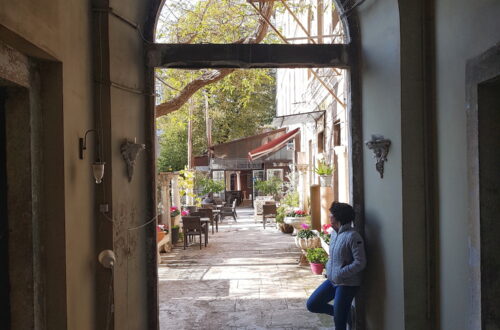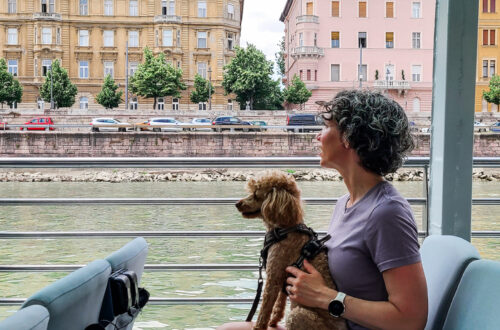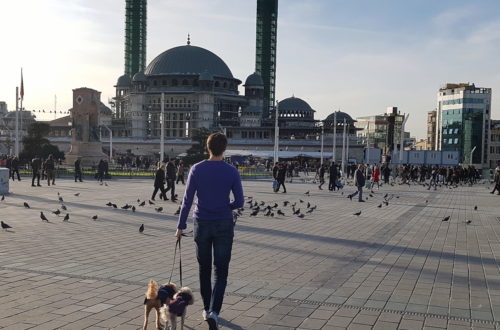
How Full-time Travel Keeps Our Costs Low
Back when we were working full time, travel was a luxury. We were fortunate to be able to take a couple major trips a year plus some weekend getaways but these would really add up. Because we had a home to maintain and ongoing fixed costs, any travel we paid for was over and above those monthly expenses.
Of course, we were also traveling during peak holiday time when everyone else is traveling and driving up the prices. And since we only had a short time to enjoy our trip — whether it was a couple weeks or a few days — we would spend more to get the perfect weather, perfect flight timing, the perfect hotel, and of course eating most of our meals out. Who wants to spend their time grocery shopping and cooking in the middle of a dream vacation?
Now that we’ve retired and are traveling full time, our situation is completely different. We travel slowly, staying in each country for a month or two or longer. We don’t have a home anywhere in the world so no ongoing fixed costs to cover. And we live like regular people on a regular schedule, not like tourists trying to see it all in a couple days. Travel has gone from being a drain on our wallet to a way for us to keep our costs low in early retirement.
Accommodations
The savings begin with accommodations, which is usually the biggest part of everyone’s budget. Certainly for us, living full time in Airbnbs in lower cost of living countries saves us a bundle versus what we would pay living in a high cost country, like Canada, Singapore or the US.
Since we always rent on a monthly basis in whatever country we’re in, we see a substantial discount versus a nightly or weekly vacation rental rate. For this we get a furnished apartment that is fully equipped with all the household goods and services we typically need, from cleaning products to wifi. So we can just arrive with our suitcases and settle in.
Instead of paying separately for utilities, home maintenance, home supplies and condo fees, it’s all included in the price of our Airbnb — which is still substantially less than renting an empty apartment in a high cost city.
Of course, we don’t just spend time in low cost countries. We can visit pricier destinations and still manage the cost of our accommodations by planning our stays around shoulder season, like we did when we spent a month in Florence in February.
Transportation
The next way we manage costs in early retirement is by not owning a car. Since we’re traveling full time, we only pay for transportation as and when we need it, whether that’s a car rental or cabs or taking public transit. No car means we don’t need to worry about insurance, parking, gas, ongoing maintenance or repairs. And because we can choose where we live in a city, we usually prefer to live near the centre so we can walk most places.
Of course, as full time travelers, we do end up flying from time to time. However, the amount of flying we do is always within our control and we can also defray some of the costs using credit card points.
Dining out
Next up is dining out. This is a category where we’re not necessarily spending less while traveling but we’re getting a lot more for our dollar. When we were living in Singapore, dining out was really expensive. This was one of the biggest line items in our budget that we basically cut out in order to save 70% of our income.
Where we might have dined out once a month in Singapore, while traveling in low-cost countries we can go out every week. In fact, we often choose to eat out even more — sometimes every couple of days — because our dollar goes so much further.
In Lviv, Ukraine, we enjoyed lavish breakfasts with sparkling wine, cappuccino and multiple courses, all for just $6 USD per person.
In Istanbul, the breakfasts were equally impressive spreads with a price that was more impressive at $4 USD per person.
Of course, when we’re in higher cost countries, dining out becomes more of an occasion, like our weekly meals out in Florence. But even in high cost Florence, there are opportunities to get more value by taking advantage of the set lunch deals, just the locals do.
Healthcare
Healthcare is one area where it’s possible to see substantial savings depending on your personal circumstances. If you are living outside the US most or all of the year, your health insurance will cost half of what it normally does. Of course, as Canadians, we have access to universal health care already. But we have certainly enjoyed the huge savings on routine check ups in low cost countries.
For example, while we were in Greece, Gillian visited the dentist for a standard teeth cleaning with x-rays for just $60 USD. In comparison, while we were back in Canada recently, I had the exact same service but it cost me $190 USD. The standard of care in both instances was excellent but the final bill looked quite different.
Data
The next area of our budget where we pay less because of traveling full time is data. As we mentioned, our wifi cost is already included in our Airbnb rental. So the additional data that we need covers the times when we are out and about in a city. We use a global data plan so that we don’t have to switch SIM cards in each country. There are many providers so it’s important to shop around. We use Flexiroam which works out very cheap for us, averaging just $17 USD per month for both of us, which is way less than we ever paid before.
Groceries
Of course, there is one area of our budget that actually costs more while we’re traveling and that is our groceries. In fact, we’re often a little embarrassed when we share our monthly grocery budget in our cost of living videos because it seems relatively high for just two people. Although one would guess that it would cost less to feed ourselves every month in lower cost countries. However there are a few reasons why it’s actually been more expensive.
First, navigating new stores in a foreign language is challenging. It’s not alway obvious which are the affordable places to shop and many towns don’t have discount superstores anyway. Once we’re in the store wandering the aisles with Google Translate, it’s not as easy to spot the great deals or even to identify our usual staples.
Another reason is that we can’t stock up with bulk items because we’re moving on within the month. So we end up buying smaller quantities that are more expensive. Finally, certain items that we’re used to might be considered more premium, especially if they are imports. Although we try to adjust to what’s available locally, sometimes we just want familiar foods. A great example of this is our morning oatmeal. This is widely available and very cheap in North America. However, in some places we’ve lived, suddenly it’s a luxury item that costs four or five times more.
Yet, despite the somewhat pricey groceries, our total expenses for the month are still far less than what we ever paid while living stationary lives and working full time.





3 Comments
Pingback:
Ingrid
Hello Girls – relatively new follower of your Vlog which I much enjoy – thanks for putting the BIG effort into it!
How do you handle car insurance for when you rent a car to get around? Do you just get the full insurance from the rental company – which might be pricey? Do you carry any international liability insurance at all? Your thoughts are most appreciated and thank you in advance.
And kudos to Gillian for mastering the stick shift driving!
Happy trails and Happy Holidays in Spain!
Ingrid
Our Freedom Years
Hi Ingrid – So great to hear that you’re enjoying our content! Apologies for the delayed reply — we’ve just come through some long travel days. For a car rental of a day or two, we often pay the extra to get a collision damage waiver with $0 deductible. However, when renting for a couple weeks or a month, we choose to accept the standard deductible, often in the range of 500 to 1,000 EUR, since paying for $0 deductible would be cost prohibitive for such a long rental. We do have some car insurance linked with our credit card but have discovered this is not usable in many countries. We don’t currently have international liability insurance but it’s something to consider. Hope that helps!